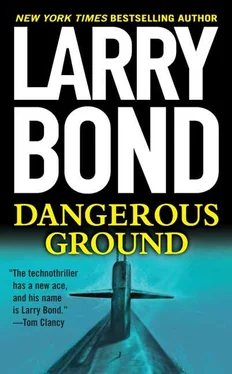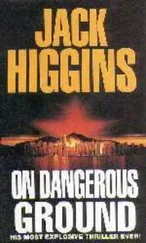Jerry had expected them to start echo-ranging again, but the next sound he heard was another torpedo starting up — and close aboard, to judge from the signal strength. He quickly turned the Manta toward the weapon, hoping to get past it and behind it, as well as triggering another torpedo countermeasure.
They must have just taken the last drop point and figured how far he’d get at five knots. They’d come closer than he liked, and Jerry decided it was time to get out of Dodge. He said as much over the circuit and Hardy’s voice immediately said, “Agreed, as quickly as you can.”
Jerry instructed the Manta to terminate the simulator mode, cut the speed to creep, and dropped to the bottom. He’d grown to trust the Manta’s safety circuits and used them now as he sent the craft within ten feet of the bottom, far closer than Memphis could ever go. The torpedo’s seeker could distinguish the hull of a submarine from the seabed, but the Manta was much smaller, a hundredth the size of a nuclear attack boat. With any luck, the torpedo’s seeker would dismiss it as an echo from the seabed.
And Jerry headed south. He kept a careful eye on the nav display, because now Memphis and the UUV were heading away from each other.
He also watched the sonar display as the torpedo’s bearing remained firmly north, behind him. Whether the seeker had never spotted him or had been attracted by the countermeasure, it was still in search mode and seemed to have no idea where he was.
“Sonar, U-bay. I need to know if you see any sign of the Russians searching to the south of that last attack.”
“U-bay, sonar. We don’t hold any active sonars in your area, but the Manta’s passive arrays will know about it as soon as we do.”
Jerry had to agree with them. He needed more information. He’d love to know where the airplane or airplanes hunting them were, but Memphis didn’t dare put up a mast.
Jerry visualized the search radius of the torpedo and turned distance into time at five knots. The next two minutes seemed eternal and Jerry forced himself not to look at his watch. He stared at the sonar display instead and willed it to remain blank.
There was no sign of attack, pursuit, or even interest in the Manta’s location, and Jerry gratefully turned the UUV east, carefully managing its depth as it rose up the steep eastern wall of the trench. He almost felt like a soldier leaving a foxhole as he brought the Manta out of the trench onto the shallow seabed.
Memphis lay over six miles away, mostly to the east, and Jerry headed straight east at first, reluctant to do anything that would bring him closer to their Russian pursuers. The problem now was to rendezvous with Memphis. With the Manta and the sub both creeping, Jerry knew he’d never catch her. “Conn, U-bay, I need to speak to the Captain.”
“Yes, Mr. Mitchell,” Hardy said after a brief pause.
“Sir, I’d like permission to go to ten knots. At Memphis’ current speed, I’ll close in an hour and a half.”
“What’s your battery charge?”
“Twenty percent. I’m good for two hours at that speed.”
“And at that speed, if you pass through a buoy field, they’ll pick you up for sure,” Hardy observed.
“Sir, I can’t catch you at five knots.”
There was a short pause. “I’m turning Memphis due north and slowing to three knots. Turn to zero four five and increase speed to seven knots. We should rendezvous in two hours.”
Jerry made the course and speed changes. “Yes, sir, and thank you.” Jerry felt genuinely grateful. It would be easy for Hardy to abandon the Manta, claiming that the risk of pursuit was too great, but his solution would keep the two units covert and still get the UUV back.
Jerry watched as the Russians remained preoccupied to the southwest. Bull Horn sonars pounded the water over the trench and by the Novaya Zemlya coastline. An occasional series of explosive charges to both the northwest and southwest confirmed Jerry’s hopes that they had indeed lost contact with the Manta, and more importantly Memphis.
Two hours later the Manta rendezvoused with Memphis. Although there had never been a problem with the automated recovery sequence, Jerry sweated every step until the latches were engaged and the umbilical connected. Drained, he slipped out of his seat and headed slowly to the wardroom for something to drink. The XO said he’d meet him there to go over the tactics Jerry had used to break contact. “Better to get them down on paper while they’re still fresh in you head,” Bair said gleefully.
Fresh? Yeah, right. Jerry thought cynically. Let’s see, how can one expand “pop chaff and evade” to fill a couple of pages of the patrol report? Still, the Manta had successfully been used to bamboozle a very determined Russian ASW force and the U.S. Navy would demand to know how it was done — in detail. As he climbed the ladder up to forward compartment, middle level, Jerry fervently hoped that there would be no further need to launch the Manta again on this cruise.
* * *
“Keep at it, Ivan,” Kirichenko encouraged his deputy. It had been three hours since there had been any trace of the American sub, or possibly submarines, he corrected himself. “They’re still there. They didn’t just vanish.”
“Yes, sir.” Admiral Ivan Sergetev tried to look determined, but couldn’t hide his disappointment. They had been so close to getting one of those arrogant trespassers that losing contact was a bitter pill to their morale. And the longer the Americans stayed lost, the greater the chance the Northern Fleet would never find them again.
“Concentrate on the second line now, but don’t stop using the first.” Kirichenko didn’t dwell on the details. Sergetev was a good tactician. He knew what to do.
“Yes, sir. I’ll find them.” On his second try, Sergetev sounded a little more confident.
Kirichenko left the situation room and headed for his office. He trusted his deputy, but not enough to bet his life on him. Keeping calm and appearing positive in front of his staff had taken every gram of his concentration. He’d need his staff’s support to back him up — later.
The only good news so far was the absolute certainty that there was a submarine to be prosecuted. It had been repeatedly echo-ranged. Aircraft had seen its wake as it fled the scene of the attack. The Americans had deployed numerous countermeasures and the sounds from those devices had been recorded. Unfortunately, the submarine had been attacked several times without result.
There was no guarantee that the second line would catch the Americans. It was scattered, still forming. Like the first one, it was made up of units that had been out training or had been in a high state of readiness. There were precious few of those in the Northern Fleet.
The second line consisted of every unit that could reach the Kara Sea before the intruder reached international waters. Diplomatically, the Russians could make a case for attacking a submarine in the Kara Sea, even if it was outside the twelve-mile limit, by invoking hot pursuit. That would be harder, much harder, in the Barents or Norwegian seas.
So he’d have to have a reason to risk international condemnation. A strong one, one that represented a clear and present danger to the motherland. Easy to do if you’re not constrained by the truth. He started drafting a message.
His staff knew that the Americans had been operating close to the coast. What they didn’t know was that he’d received top secret, compartmented information from the Northern Fleet’s counterintelligence officer. A foreign agent with stolen codes had evaded the FSB and was trying to leave the country. His last known location was in the Arkhangel’sk Oblast. If he had somehow managed to get to Novaya Zemlya and was aboard that submarine, and that sub made it safely back to port, Russian military communications would be compromised. Even after the codes were changed, Western intelligence would still be able to read a decade’s worth of encrypted messages. The damage to Russian security would be grave. Extreme measures had to be taken to prevent this from happening.
Читать дальше












